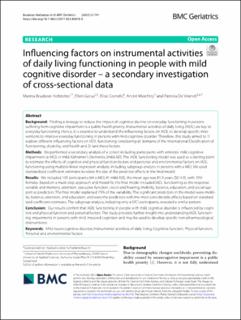Please use this identifier to cite or link to this item:
https://doi.org/10.21256/zhaw-26477| Publication type: | Article in scientific journal |
| Type of review: | Peer review (publication) |
| Title: | Influencing factors on instrumental activities of daily living functioning in people with mild cognitive disorder : a secondary investigation of cross-sectional data |
| Authors: | Bruderer-Hofstetter, Marina Gorus, Ellen Cornelis, Elise Meichtry, André De Vriendt, Patricia |
| et. al: | No |
| DOI: | 10.1186/s12877-022-03476-8 10.21256/zhaw-26477 |
| Published in: | BMC Geriatrics |
| Volume(Issue): | 22 |
| Issue: | 1 |
| Page(s): | 791 |
| Issue Date: | 2022 |
| Publisher / Ed. Institution: | BioMed Central |
| ISSN: | 1471-2318 |
| Language: | English |
| Subjects: | Cognitive function; Instrumental activity of daily living; Mild neurocognitive disorder; Personal and environmental factor; Physical function; Activities of daily living; Aged, 80 and over; Cognition; Cross-sectional study; Female; Human; Male; Neuropsychological test; Cognitive dysfunction; Dementia |
| Subject (DDC): | 615.82: Physical therapy 616.8: Neurology, diseases of nervous system |
| Abstract: | Background: Finding a strategy to reduce the impact of cognitive decline on everyday functioning in persons suffering from cognitive impairment is a public health priority. Instrumental activities of daily living (IADL) are key to everyday functioning. Hence, it is essential to understand the influencing factors on IADL to develop specific interventions to improve everyday functioning in persons with mild cognitive disorder. Therefore, this study aimed to 1) explore different influencing factors on IADL functioning considering all domains of the International Classification of Functioning, disability, and health and 2) rank these factors. Methods: We performed a secondary analysis of a cohort including participants with amnestic mild cognitive impairment (a-MCI) or mild Alzheimer’s Dementia (mild AD). The IADL functioning model was used as a starting point to estimate the effects of cognitive and physical function factors and personal and environmental factors on IADL functioning using multiple linear regression analysis, including subgroup analysis in persons with a-MCI. We used standardized coefficient estimates to relate the size of the predictor effects in the final model. Results: We included 105 participants (64 a-MCI, 41 mild AD); the mean age was 81.9 years (SD 4.9), with 70% females. Based on a multi-step approach and model fit, the final model included IADL functioning as the response variable and memory, attention, executive function, vision and hearing, mobility, balance, education, and social support as predictors. The final model explained 75% of the variability. The significant predictors in the model were mobility, balance, attention, and education, and were the predictors with the most considerable effects based on standardized coefficient estimates. The subgroup analysis, including only a-MCI participants, revealed a similar pattern. Conclusion: Our results confirm that IADL functioning in people with mild cognitive disorder is influenced by cognitive and physical function and personal factors. The study provides further insight into understanding IADL functioning impairments in persons with mild impaired cognition and may be used to develop specific non-pharmacological interventions. |
| URI: | https://digitalcollection.zhaw.ch/handle/11475/26477 |
| Fulltext version: | Published version |
| License (according to publishing contract): | CC BY 4.0: Attribution 4.0 International |
| Departement: | School of Health Sciences |
| Organisational Unit: | Institute of Physiotherapy (IPT) |
| Appears in collections: | Publikationen Gesundheit |
Files in This Item:
| File | Description | Size | Format | |
|---|---|---|---|---|
| 2022_Bruderer-Hofstetter-etal_Influencing-factors-instrumental-activities-of-daily-functioning.pdf | 1.05 MB | Adobe PDF |  View/Open |
Show full item record
Bruderer-Hofstetter, M., Gorus, E., Cornelis, E., Meichtry, A., & De Vriendt, P. (2022). Influencing factors on instrumental activities of daily living functioning in people with mild cognitive disorder : a secondary investigation of cross-sectional data. BMC Geriatrics, 22(1), 791. https://doi.org/10.1186/s12877-022-03476-8
Bruderer-Hofstetter, M. et al. (2022) ‘Influencing factors on instrumental activities of daily living functioning in people with mild cognitive disorder : a secondary investigation of cross-sectional data’, BMC Geriatrics, 22(1), p. 791. Available at: https://doi.org/10.1186/s12877-022-03476-8.
M. Bruderer-Hofstetter, E. Gorus, E. Cornelis, A. Meichtry, and P. De Vriendt, “Influencing factors on instrumental activities of daily living functioning in people with mild cognitive disorder : a secondary investigation of cross-sectional data,” BMC Geriatrics, vol. 22, no. 1, p. 791, 2022, doi: 10.1186/s12877-022-03476-8.
BRUDERER-HOFSTETTER, Marina, Ellen GORUS, Elise CORNELIS, André MEICHTRY und Patricia DE VRIENDT, 2022. Influencing factors on instrumental activities of daily living functioning in people with mild cognitive disorder : a secondary investigation of cross-sectional data. BMC Geriatrics. 2022. Bd. 22, Nr. 1, S. 791. DOI 10.1186/s12877-022-03476-8
Bruderer-Hofstetter, Marina, Ellen Gorus, Elise Cornelis, André Meichtry, and Patricia De Vriendt. 2022. “Influencing Factors on Instrumental Activities of Daily Living Functioning in People with Mild Cognitive Disorder : A Secondary Investigation of Cross-Sectional Data.” BMC Geriatrics 22 (1): 791. https://doi.org/10.1186/s12877-022-03476-8.
Bruderer-Hofstetter, Marina, et al. “Influencing Factors on Instrumental Activities of Daily Living Functioning in People with Mild Cognitive Disorder : A Secondary Investigation of Cross-Sectional Data.” BMC Geriatrics, vol. 22, no. 1, 2022, p. 791, https://doi.org/10.1186/s12877-022-03476-8.
Items in DSpace are protected by copyright, with all rights reserved, unless otherwise indicated.